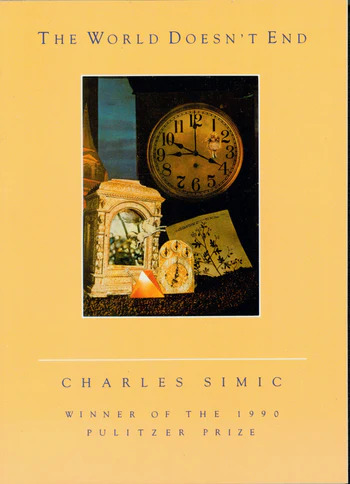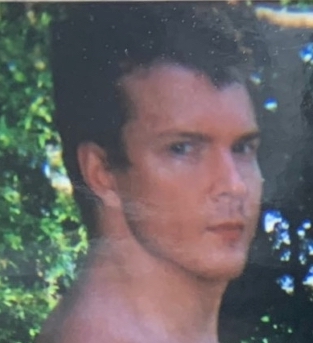It’s June. The wind is folding up the clouds until they’re small as pocket squares. Everything is green: the grass, the garden spiders, the tape holding my roommate’s car together. I want nothing but to sit and read and let the pollen fall like powdered sugar. Today, I have no thoughts about the state of things. My head is a milk carton full of light and summer air.
It’s days like this that I get most upset that I will one day die. It’s also days like this I feel most fortunate to have a book like Charles Simic’s The World Doesn’t End to carry with me through my days—a book which, for all the violence it contains, all the liquid strangeness, all the pain, has always seemed to me to look at death with a steady, if somewhat smoky, optimism.
The World Doesn’t End is, in essence, a storybook—one full of old gods, new gods, beautiful misfortunes, and terrifying miracles. In it, comedy and tragedy are never out of earshot of each other. They are like two sides of the same sheet of paper—you can’t take one away without making the other disappear. When a dead man steps down from the scaffold, he orders two beers: one for him and one for his head. When the narrator gets his thumb cut off, a veiled woman in a driverless limo uses it to paint her lips.
As I’ve gotten older—i.e. emerged from my early and mid-20s intact, despite my best efforts to do otherwise—it’s begun to dawn on me that perhaps my life’s a thing I should handle with care. With that realization has come a new, and rather potent, fear of dying—death waits in me “like a light switch,” as Komunyakaa said, and I’ve begun to avoid quite carefully all the things that might flip it.
This has led to me leaning more and more on literature—not to comfort me, exactly, not to “teach me how to live,” but to expand my sense of what my life can be while I still have it… to remind myself that the world is stranger, crueler, and more beautiful than any of us really know, and that I am, for better or worse, a part of it. After reading Charles Simic, I sometimes even feel that it’s a lucky thing, to live down here in God’s sock drawer. And every once in a while, in a rare moment of clarity, I even adopt his secret identity: “The room is empty, / And the window is open.”




